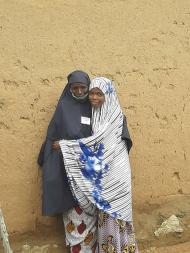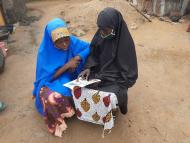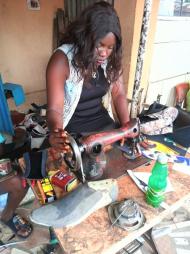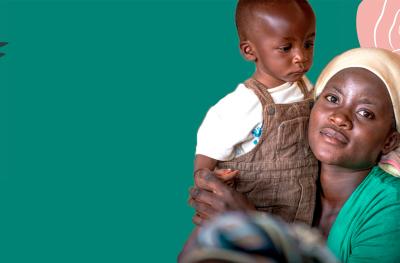Every woman has the power to transform her own life — and the lives of girls around her. We can pave the way for the next generation of women. For example, in Iraq, women doing online trainings sometimes listen alongside their daughters, to share valuable lessons. In Rwanda, graduates pass their skills onto girls in their family, investing in their future.
Aishatu and her daughter, Ummi
Aishatu: I had been thinking of sending my daughter off to get married before completing her secondary education (like most Muslim girls in my community do) but my views changed after I joined Women for Women International’s Stronger Women Stronger Nations Program. I learned the dangers I would be putting my daughter in. I realized that I would also be violating her human rights, just as mine were violated many years ago when I got married at the age of 15. So, I decided to ensure that I would teach my daughters what I was taught so that they can choose a course in life that would be different from mine.
I have four daughters, and Ummi as the eldest. I share what I learn with them all but most especially with her because she is at the most vulnerable stage of her life as a young woman.
At 17 years old, Ummi is currently in Senior Secondary School and is studying diligently for her final examination at home since schools are closed due to the COVID-19 pandemic. Though some people in my neighborhood have complained that she is ripe for marriage and she should be in a man’s house, I always tell them that the decision to get married is hers and not mine to make.
Ummi: My mother has taught me the importance of education. Education will empower me to make good decisions in my home and community. Although some people in our community have been pestering my parents to give me away in marriage, thankfully, my parents are fully in support of me finishing my education. I plan to pursue an education in health after secondary school before I consider marriage.
Rather than rushing into marriage as a way of showing others that I need a man before I can have my rights, I have started sharing what I am learning with other young girls in my community. I have learned to love, respect, and value myself.
From my continued discussions with my mother, I came to understand that women have equal rights to men. I have a right to education, marriage, to inherit properties and be respected. I had initially thought that women do not have rights until they marry and are only allowed to enjoy some rights by their husbands. I believe this may be the reason many of us — young girls — are always eager to get married once we get a bit of education, not realizing that we are denying ourselves our fundamental human right to education.
Boldness is one quality my mother has instilled in me.
I am not a participant of the Women for Women International program, but I have become a beneficiary, courtesy of my mother. Although I am a shy person, what I have learned from my mother has built my confidence.
My mother and I have become close friends because of the common knowledge we share.
Talatu
The society believes that educating a girl child is a waste of time and resources because when educated, she will disrespect her husband, becomes arrogant, and hard to discipline. It is widely assumed that the rightful place for a girl child is her husband’s house...
Growing up, I had the ambition of being educated to be economically and socially independent because of the different forms of violence I witnessed women facing, which often led to their untimely death. My parents did not support my education after primary school. They wanted to marry off at the age of 15, which I refused.
Talatu is a trainer at Women for Women International. Watch the video to learn more about the expectations for girls in Nigeria and how she soared past all of them.
Saratu
My name is Saratu. I am a native of Iburu in Kajuru Local Government Area of Kaduna State in Northern Nigeria. I am 52 years old and I have been widowed for almost two decades. I have four sons and two daughters, who live with me in our family house in Kaduna.
My life’s journey at the early age of seven was characterized by hard work, sacrifices, determination, resilience, independence, and an enterprising spirit – this is a trait inculcated in me by my late mother.
My father never believed in the education of a girl, and my mother was not so liberated, either, to support me better. Consequently, I got married immediately after my secondary school education.
My daughters are my pride, and I am fulfilling the promise I made to myself to ensure they both have good education. I have taught my daughters to be strong, wise, courageous, and independent. I taught them never to depend on their husbands when they eventually get married but to aim for success through hard work and determination.
After graduating from Teacher Training College without a job, I encouraged and supported my eldest daughter to learn to make body cream. She now makes and sells her products from our home and is planning to get a shop.
For my second daughter — who was waiting for admission to further her education following a diploma program she finished last year — I advised her to learn how to make shoes and sandals. At first, she was not comfortable with the idea because it is considered to be a ‘man’s job,’ which would seem odd if she ventured into it; she preferred tailoring.
I told her that I was taught in the Women for Women International program that no job or business is exclusively meant for either men or women but what really matters is her knowledge, interest, and skills in the desired trade. I ventured further to tell her that the clothes-making business was already saturated in the vicinity we reside in, but she can carve a niche for herself making shoes. Thankfully, saw my reasoning and she is presently perfecting her skills in the trade.
After learning about gender equality in the program, I educated all my children about the equal status and rights they share. My girls were very surprised! If not for my revelations through attending the training, they would have been subjected to the same violations my mother and I went through. I told my children that none of them are or should feel more important than the other, whether male or female. I resolved with them that the family house will go to the boys and the only piece of land I bought in the name of my oldest son will be changed and given to the girls because they also have a right to inheritance. The procedure for changing the name of the asset is presently ongoing.
I taught my daughters never to condone an abusive relationship, whether in or outside marriage. They must love and care for themselves; have a voice and not to tow the path of silence in domestic violence. My daughters marvel and commend the changes and confidence they now see in me and I can see that they are fashioning their lives after the ‘new’ me.





